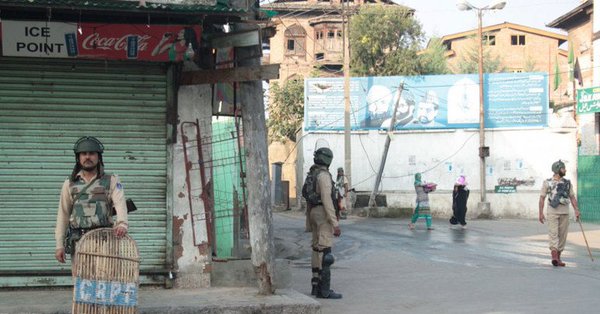
UN rights chief calls for international inquiry into Kashmir violations, India slams report
New York, June 15 (IBNS): Decades of rights violations on both sides of the Line of Control in Kashmir have “claimed or ruined numerous lives” and should be the subject of a high-level international probe, the UN’s human rights chief said on Thursday even as India rejected the report as motivated based on unverified inputs.
In response to a question on the Report by the Office of the High Commissioner for Human Rights on “The human rights situation in Kashmir”, the official spokesperson of the Ministry of External Affairs said India rejects the report, which "is a selective compilation of largely unverified information.
"It is overtly prejudiced and seeks to build a false narrative," the MEA said.
It said the UNHRC report violates India’s sovereignty and territorial integrity.
India is at the receiving end of Pakistan exported cross-border terrorism in Kashmir forcing a strong deployment of its armed forces in the territory.
Many Indian soldiers died in guarding the Indian borders with Pakistan while armed forces are also facing regular protests funded by Pakistan, which are violent in nature. Stone pelting is a regular phenomenon in Kashmir as India said stone pelters are sponsored by Pakistan.
Flagging the launch of the first UN human rights report on the disputed territory separating India and Pakistan, Zeid Ra’ad Al Hussein noted his intention to ask the Human Rights Council in Geneva to set up a commission of inquiry at its next session, beginning on Monday.
The High Commissioner – whose mandate ends this summer - highlighted what he called the “chronic impunity for violations committed by security forces” and said that the political nature of the conflict had masked the “untold suffering” of millions of people.
The main focus of the 49-page report is the use of reported “excessive force” by soldiers in the Indian state of Jammu and Kashmir, although it also examines a range of rights violations in Pakistan-Administered Kashmir.
In Indian-Administered Kashmir, the report details how large demonstrations erupted in Jammu and Kashmir two years ago after Indian security forces killed the leader of an armed group.
It notes how “excessive force” led to the deaths of an estimated 145 civilians from mid-2016 to April this year.
Victims’ lack of access to justice remains a key challenge in Jammu and Kashmir, the report from the UN human rights office, OHCHR, continues.
It details how bespoke legislation gives security personnel “virtual immunity” against legal redress unless the Indian government authorizes it, and says that “there has not been a single prosecution” in the nearly 30 years that the Armed Forces (Jammu and Kashmir) Special Powers Act has been in force.
This “almost total impunity” has also hindered inquiries into enforced or voluntary disappearances, the report continues, citing allegations of mass graves in the state and the alleged mass rape of 23 women by soldiers in Kunan-Poshpora nearly three decades ago.
Turning to Pakistan-Administered Kashmir, the OHCHR report describes rights violations there as being “of a different calibre or magnitude”.
It details restrictions on freedom of expression and people’s right to peaceful assembly in two territories – Azad Jammu and Kashmir (AJK) and in Gilgit-Baltistan - and expresses concern at the “very broad definition of terrorism” amid reports that hundreds of people have been detained under Pakistan’s anti-terrorism legislation in Gilgit-Baltistan alone.
Any resolution of the political situation in Pakistan-administered Kashmir and Indian-administered Kashmir “must entail a commitment to end the cycles of violence and ensure accountability for past and current abuses by all parties”, Zeid said.
Support Our Journalism
We cannot do without you.. your contribution supports unbiased journalism
IBNS is not driven by any ism- not wokeism, not racism, not skewed secularism, not hyper right-wing or left liberal ideals, nor by any hardline religious beliefs or hyper nationalism. We want to serve you good old objective news, as they are. We do not judge or preach. We let people decide for themselves. We only try to present factual and well-sourced news.







